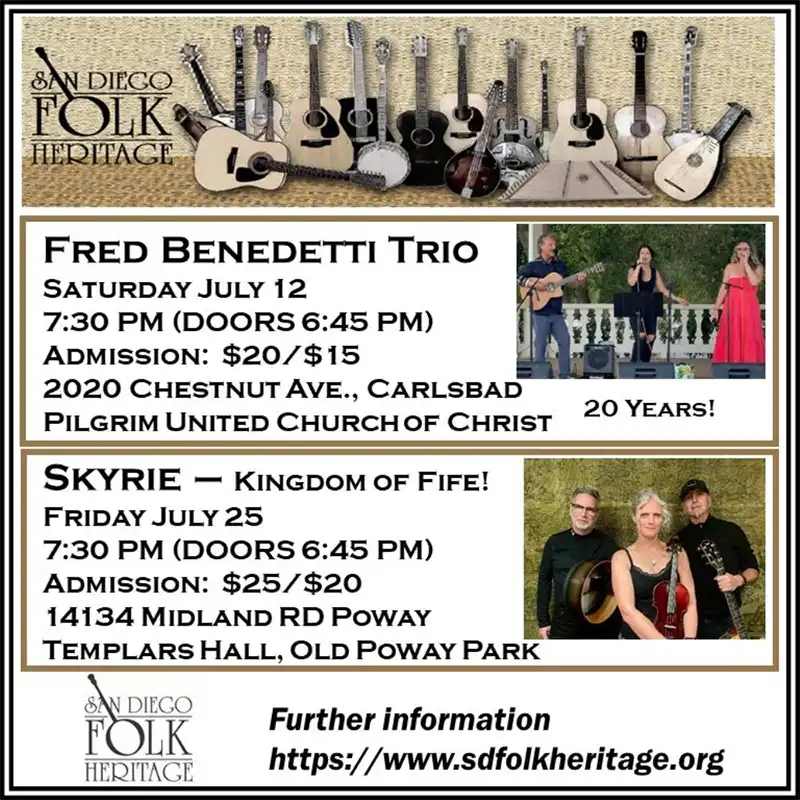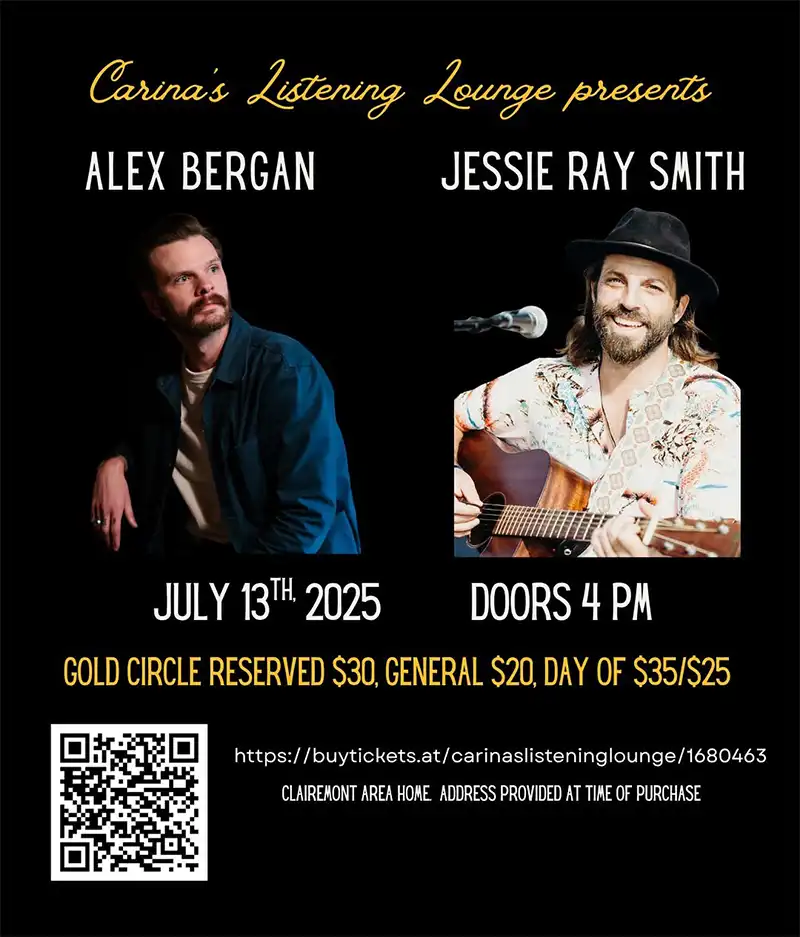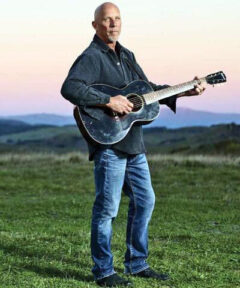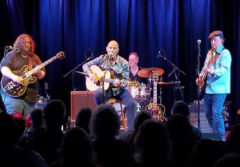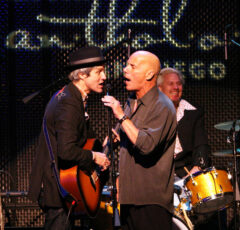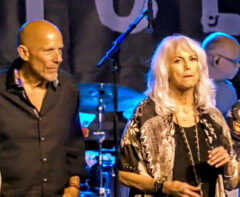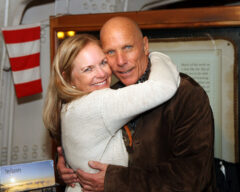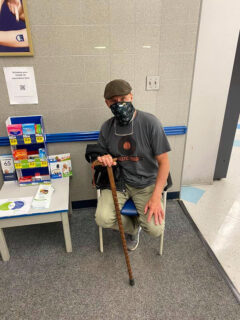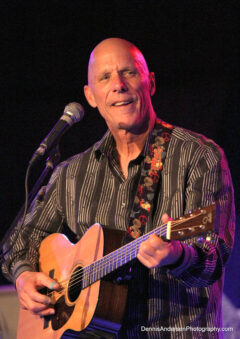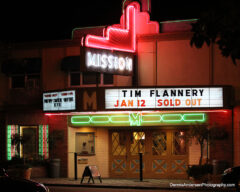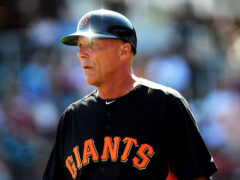Cover Story
Never Stop Believing. Tim Flannery Is Unstoppable!
In early March of 2020, Tim Flannery and his band, the Lunatic Fringe, were having a blast. They were in Northern California playing a gig and celebrating guitarist Jeff Berkley’s 50th birthday. Flannery recalled, “We knew about COVID-19 and thought no one would venture out, but those two nights were packed. On the second night, I really thought this might be our last show ever. We talked lots about it as a band and that night we went off on stage and just had an amazing night. The next morning, all our shows were cancelled, and my TV gig for MLB [Major League Baseball] was done. In one day I lost two of the things I loved.” That would not be the worst part of the year to come, though Flannery had no way of knowing that at the time. He would come face-to-face with death in what would become a literal fight for his life. He would emerge on the other side with a reinforced sense of gratitude and an intense desire to honor his family and to keep on making music.
All the Things We Carry
“It was October 9, 2020, and my son Jesse’s birthday party,” remembered Ginny Flannery Jones, Tim Flannery’s oldest daughter and mother to his three grandkids (Jade, 4; Jesse, 2; and Josie, 1). Jones and her husband, Travis, had arranged for a special COVID-19-safe birthday party for the family to celebrate, and the theme was Toy Story. “Jesse LOVES Buzz Lightyear,” explained Jones. “We realized we wouldn’t be able to visit Disneyland as we’d originally intended so we decided to get all the grandparents to dress up. I helped get some costume pieces and made sure they knew who to dress up as. The look on Jesse’s face when they all walked through the door as the characters might have been even better than Disney!” That day Flannery dressed up as Woody, the cowboy character from the original movie, and his wife, Donna, was Bo Peep (from Toy Story 4). Jones continued, “My dad was complaining about his back hurting. He said he must have pulled it carrying Jesse around. He tried getting a massage, iced it, took lots of Advil and all the other things that you do when your back hurts. It didn’t seem to get better. The next day, like he usually does, he took off to his canyon at his ranch to try and heal.”
Alone in the Maker’s Hands
The ranch is Flannery’s off-grid paradise tucked into a small holler of the hills just north of Santa Barbara. He has spent a lot of time there in the off-seasons of his 26-year baseball career (10 years as a player for the San Diego Padres, three years as a minor league coach, and 13 years as the third-base coach for both the Padres and the San Francisco Giants, including when they won three World Series titles), and now, in his retirement, he seeks the solace of this California heaven on earth as often as he can. Throughout the pandemic, he’d been splitting his time between the ranch and his home in San Diego’s North County. “I just started growing lots of food, potatoes, fruit trees, and lots of vegetables. I was working the land and learning how to live differently,” he said. In fact, he celebrated his own birthday at the ranch about two weeks before Jesse’s party. He wrote this Facebook post: “I’m somewhat blown away from all the birthday wishes today. In the middle of this crazy time in our world, I gained some very needed hope from the love and friendship I felt today…I am 63 years old and took my first Social Security check, I also chain-sawed a downed tree and rode some big waves. ‘If I don’t die by Thursday, I’ll be roaring Friday night.’ Big love…….thank you…” Flannery quoted his friend and fellow songwriter Jimmy Buffett in that post, but he could not have known how prescient those words were.
After getting back to the ranch, Flannery was in severe pain though he didn’t share how much, even with his loved ones. He and his wife thought it was maybe a slipped disc. On October 14, somehow, he drove back to his home in San Diego where his daughter, Kelly, who is a nurse, was there to help him.
“We still don’t know how he got himself home from Santa Barbara to San Diego but when he got home, he was not right,” explained Ginny Flannery Jones. “He went to the doctor to get an x-ray, and it showed nothing. He also did a urinalysis, but results would take a few days. He was SO sick. I did a video call with him. It was the first time my husband, Travis, had seen him in a week or so. The conversation didn’t make much sense, and my dad didn’t look right. Travis was very concerned. I called Kelly, my sister, who was at the house with him, and she confessed he was not okay, but he was begging to not go to the doctor.” The Jones family took action as Flannery explained in this Facebook post from December 5, 2020. “About seven weeks ago on a Saturday (like today) not knowing my organs were failing and falling into sepsis, Travis Jones and his paramedic and firemen buddies came to my house uncalled (I’m too stubborn to call) and threw my ass in a paramedic truck and took me to the hospital and saved my life. It’s hard to understand the power of love sometimes until you know the magnitude and realize that you’re part of an ‘act of God,’ so today, looking back, in the same bed they peeled me out of, I want to say thank you, I love you, you all are angels.”
Flannery’s wife, Donna, recalled that moment. “Our paramedic friend said to call 911 because he’s in sepsis, so we said our first goodbye.” Sepsis is a potentially life-threatening condition that occurs when the body’s response to an infection damages its own tissues, according to mayoclinic.org. In Flannery’s case, the infection that his body was responding to was a Staph infection that had created spinal abscesses (which is what was causing his back pain). On top of that, he also had double pneumonia and a bladder infection. Flannery underwent an emergency laminectomy to remove the abscesses from his spine and was given antibiotics, which, however, did not work as expected. Donna Flannery continued, “He had another back surgery to make sure the wound was free of Staph. They found two more pockets on his psoas muscle. Finally, he responded to antibiotic number four and his CRP (C-reactive protein) numbers dropped below 100 (normal is 1 to 10). They wanted him to go to skilled nursing the first week of November, but I refused, and they let him come home with a PICC line. I infused him daily [with antibiotics] and did occupational and physical therapy. All was good until it wasn’t.”
While he’d been in the hospital, and then when he was at home, Flannery was fighting enemies unseen. It wasn’t just the debilitating infection, but also byproducts of its full-body takeover: hallucinations. Flannery elucidated, “During the two months of battling the infection in my blood stream, I had nightly hallucinations that were vivid, horrific, time-traveling episodes that I wouldn’t wish on anyone. I hated the nighttime.”
His wife continued, “He ended up hallucinating again at home and then had seizure-like activity. We called 911 again on November 15 and said goodbye a second time.”
“I collapsed on the floor of my house shaking out of control, and when the paramedics arrived I remember saying goodbye to my wife knowing for sure this was the moment I was gonna die. It was a real moment that I knew this was my time to die. I believed I wouldn’t see my wife ever again,” related Flannery.
“He was shaking so badly from the antibiotics they had to sedate him,” remembered Donna Flannery. “He had sitters in his room every night so he wouldn’t cause harm to himself or anyone else.”
Of course, as Flannery is a public figure due to his enduring presence through baseball and from his many years as a performing musician, this dire health emergency became a media story. News of his hospitalizations were reported by numerous sports and news outlets, and someone needed to help manage that. That’s where Flannery’s tour manager and “Team Mom,” Kendee Eusted, came in. Flannery met Eusted five years ago at the High Sierra Music Festival. “She is wonderful because she handles everything I can’t stand about the music business. I love to walk on stage and play; she allows me to save all my time and energy to do just that,” summarized Flannery. When it came to this non-music crisis, she was more than willing to pitch in. She explained, “I have always been more than a tour manager to him and this band. They are my family and my love for them is deep and genuine. My number one responsibility in the music world is to protect and take care of them.” Though she had no way to do that as far as his illness was concerned, she came off the bench to help where she could. “I immediately started being the conduit for his wife, his kids, and his friends as well as his large supportive network of extended baseball and music family,” she continued. “I updated our social media platforms as often as I could and coordinated with Donna [Flannery] daily on updates, setbacks, successes, prognoses, and ultimately diagnosis. I had multiple text groups going for the family, the band, and the people involved with the Love Harder Project to keep them as informed as possible as they were all worried and also feeling helpless and scared.” The Love Harder Project is the non-profit charitable organization dedicated to putting a stop to the atrocities born from bullying and acts of violence that Flannery founded in response to the horrific attack on a San Francisco Giants fan, Bryan Stow, at Dodger Stadium in 2011. Eusted added, “We also responded to media and reporters (with the help of his boss, Devon, at NBC Bay Area) trying to squelch the rumor mill, which at times was really frustrating and upsetting. But we just stayed the course and continued to keep the folks who were concerned and sent him love and prayers as updated as we could.”
There were also social media updates from the family, like this Facebook post from Ginny Flannery Jones on November 25, 2020: “Just in time for THANKSGIVING, we got Papaw out of the hospital again tonight! Thank you for all the prayers and love you have sent him and our family. The fight continues but once again he is back with us.”
Donna Flannery explained, “Finally, the antibiotic daptomycin worked, and he came home before Thanksgiving.”
Flannery added in his own post, “My beautiful family came from the four directions tonight to bring their love and thanksgiving and break me out of the hospital and take me home, and they had a hospital bed waiting for me. I love you all. Let’s beat this thing.”
Road to Recovery
While it seemed that Flannery was finally on the mend, he still faced a long recovery ahead of him. He explained, “I came home in a wheelchair, two surgeries to my spine and not being able to get out of bed for close to three months. I lost all my muscles and ability to walk. The atrophy made me lose 35 pounds. Before the surgeries, the doctors told my wife there’s a chance I would never walk again and could be in a wheelchair the rest of my life, so to be able to walk and learn to live again was my only job; I am still working on it daily. Really, the physical part takes time, but anyone who knows me knows the rehab work to get my body back hurt tremendously and gave me many reasons to quit, but I started learning to walk again with the walker in our driveway, then I moved on to riding my bike, lots of squats, push-ups, patience, and prayer. My faith is surrender and trust in the higher power.”
Flannery, however, never discounts what is right in front of him and is the first to effusively thank Donna, Ginny, Kelly, and his son, Danny. “My wife and family saved my life. She [his wife] nursed me back to health, still to this day she does. What my family did, what my daughters and son did, was to never give up believing.” Still, his good physical health prior to the infection as well as his strong mindset also came into play. “I was told my blood work numbers and the sepsis showed I didn’t have much of a chance to live. Because of all my farming, digging holes for trees, building fences at the ranch, surfing daily, the doctors said being in that type of physical shape helped to save my life. They also said I was too stubborn to die.” Donna agreed, “The emotions were a roller coaster. The doctors were giving me all these possible scenarios like full reconstruction on his back, and basically if he was going to live. He has a strong will, obviously, and wanted to live. One of his high school friends who is a doctor said that most people don’t survive one of these hospital trips let alone two.” She also humbly acknowledged, “I infused him every morning with antibiotics ‘til the 18th of December. I think I’ve been pretty helpful in his recovery; it’s pretty much been my job.”
‘Til I Gain Control Again
Working on his physical recovery was not the only road he had to traverse. He also came to understand that it was time for him to get sober. In an emotional revelation, he tried to explain how, in his hallucinatory state while in the throes of his illness, he saw a friend. “I had visits by people in my hallucinations. One was by Steve Poltz and another man I’ve never met. Steve sat next to me. He had painted red ears and fire in his eyes. It was so heavy. The other man said to me, ‘We have watched you burn yourself down for years and we can help you.’ Steve just smiled and was so calm and never said anything but gave me a sense of safety. When I left the hospital after two months and many more of these hallucinations, I just felt I would try life without alcohol. I didn’t consider myself a big drinker, but I just consistently had a glass of wine in my hand, or after ball games a cocktail with Advil to medicate my pain. I don’t miss drinking, so now coming up on 10 months clean I decided to stick with it. I feel so great. I might drink some wine someday but not today. One day at a time.”
Many Faces of Love
December 12, 2020 was a special day. It was granddaughter Josie’s fourth birthday, and Ginny Flannery Jones was at it again with another Disney-themed COVID-safe family party. This time, the theme was Disney princesses. Papaw Flannery was dressed up as Frozen’s Kristoff with a walking stick accessory to help him get around. Becoming a grandfather has only crystallized Flannery’s deep love for his family. Jones said, “My dad is meant to be a grandpa. The love he gives the babies is amazing. Being a grandpa has made him tone down his life for sure, to stay in the moment and check in every day. He knows how fast it goes being a parent of three, which I am learning now.” Flannery emphasized this thought, “I have three grandkids who have changed my life in such a beautiful way.”
Music Box
“Being the true poet Flan is, he had already started writing words to new songs about his experience,” said Shawn Rohlf, a member of the Lunatic Fringe and close friend of Flannery. In December, he had posted a photo of his hand with a medical bracelet that boldly said: FALL RISK. To accompany the photo Flannery wrote, “This was my label I had to look at, six weeks locked down in hospital. Through many MRIs, surgeries, tests, nights all alone, I didn’t mind it, in the scheme of things it was true, I’d look at it in the middle of the night and weep; I’d stare at it and belly laugh in the darkness. It will however become the title of a new record someday.” A couple weeks later, he posted these lyrics:
Fall Risk
Confusion hit me hard in the heartland
I was blinded by the things I could not see|
ravaged by the storms of my creation
broken and shipwrecked and lost at sea
So I looked everywhere for the answers
I cried out for mercy to the wind
With my last breath I prayed for my salvation
And on my knees I learned to live again
Through the years the pain would follow me in darkness
I shadow boxed with demons in the night
Hand to hand the battle crossed every country
Losing parts of me still buried in the fight
I looked everywhere for a reason
I cried out for mercy to the wind
With my last breath I begged for redemption
On my knees I learned to live again
On my knees I learned to live again…
He later posted a raw video of another new song he was working on called “Waiting on a Miracle.” He explained in the post, “To all the people who showed kindness to me in real life and in these dreams, thank you…The doctor told me I was too stubborn to die, I think it was more what was given to me in love by friends and strangers, in this world, and the one I visited.”
When asked, he confirmed that he is close to starting a recording project with these new songs, and he also mentioned another song title, “Falling Stars and Thunderstorms.” He is still trying to process the visions and hallucinations he saw (“I have to ask my wife if things happened or not.”). He knows it wasn’t just him who fought and allowed him to keep going.
One More Song
“My band and best friends kept checking on me,” confided Flannery. “Berk [Jeff Berkley] for weeks kept trying to nudge me to come play a couple. I couldn’t sit up or even hold a guitar for four months, so I lost my chops.
“When he was finally back home and able to have guests, Jeff and I would go up there once a week and have what we called our ‘Fighting Poet Meetings,’” related Rohlf. “Just the three of us sitting around on the porch telling stories and laughing. We weren’t sure how things would go with playing again. We were all just incredibly grateful and happy to be together again!”
By March of 2021, a year since he last was on stage and about five months since his second hospitalization, Flannery felt well enough to get out and play. “Flan had a standing invite to come and play when he felt like the time was right to get back to it,” bandmate and longtime friend Jeff Berkley said. Berkley had been livestreaming every week during lockdown in the pandemic. Finally, in a full circle moment, Flannery appeared on Berkley’s birthday show. “When Flan called and said, ‘I’m coming to your livestream for your 51st birthday,’ it was like the universe was saying, ‘THE TIME IS NOW,’” recalled Berkley.
“I will forever be grateful for the love of Jeff and Shawn and their encouragement, for their support and inspiration to start playing again,” expressed Flannery.
Come on Down to the River
“Been on the Green River and the Salmon River with these river legends, headed mañana to the Colorado through the Grand Canyon. I’m ready, strong, and willing,” wrote Flannery in a Facebook post in April 2021. “I had to really push my body to get to a point that I could even go because it’s a physical trip, camping under the stars for nine nights,” he explained. He was ready. Along with wife, Donna, and daughter, Kelly, Flannery relied on Rohlf (also a former river guide), as well as other experienced rafters to complete this intense journey. This particular trip, following the struggles of his illness and as he continued to get stronger, was quite profound for him. He clarified, “It really was a chance to reëvaluate my life and what I was going through. We were living in a place where the only thing you think about is the 1.9-billion-year-old rock you’re surrounded by. Our lives are pretty much insignificant in terms of our day-to-day plans, and the Grand Canyon forces you to get outside your head and body and think of the supreme power of the creator of this place, and what you might think you hopefully will do to be remembered, and also that you might not ever be remembered. That’s pretty eye opening as well.”
Last of the Old Dogs
Flannery came back from the Grand Canyon feeling stronger. He went surfing with bandmate Doug Pettibone. In May he did a solo show in Solvang. Then he got an invitation to play a show he couldn’t refuse.
Susan Walker, widow of Jerry Jeff Walker, who died in October 2020 of throat cancer, was organizing a memorial concert and asked Flannery to perform a song he wrote for Walker called “Last of the Old Dogs” as well as one of Walker’s songs, “Last Song.” Jerry Jeff Walker was not only a friend but also a hero to Flannery who told this story, “I played in the Texas Leagues in 1979 and rode for 20 hours on buses to play baseball, trying to get to the big leagues. I listened to Jerry Jeff’s music, played his music all through my life. Well, years later, he wanted to meet me, so he came to San Francisco when I was coaching and next thing you know we were hanging out together, doing shows together, getting in trouble together; I became, and still am, part of his family. For the last few years, we would talk almost every other day.”
In June, Flannery and his wife went to Luckenbach, Texas, and he performed for the sold-out crowd of about a thousand die-hard Walker fans along with such luminaries as Emmylou Harris, Steve Earle, Jimmy Buffet, and Rodney Crowell among others. Of the experience, Flannery rhapsodized, “We put on a show telling stories and singing his songs. It is the highlight of my musical career, but it was almost like one of the good hallucinations I had in the hospital because it was so surreal. I really miss the old Scamp, but the gift he gave me in terms of music, songs, attitude, and humility I will carry on forever.”
Whatever Comes
After all that Tim Flannery has been through this past year, literally facing death a couple different times, it’s nearly impossible not to be a bit changed or to have a different perspective on life. His daughter, Ginny, thinks that’s true. “I don’t think you can see death so close and not be changed, but there are some things that haven’t changed at all. He has become calmer and more in the moment than he has ever been. He knows he got a second chance, and from what I have seen so far I think he is going to live like that from here on out.”
Team Mom Kendee Eusted agreed. “I know it changed him as he invests in himself differently. It reinforced his appreciation and gratitude for this life being a precious gift, but I think he looks at time differently.” She went on, “The phrase live life like a 3-1 count is pretty applicable here… there are times when he has no idea how he made it, or why, but he DID, and he’s gonna squeeze every last drop out of every day until his last, spreading love and laughter and light and music into every corner he can find—more so than he ever has before, and he was pretty damn good at it already.”
Flannery’s own response was a bit more subdued but still heartfelt. He said, “The fight of my life was more of a miracle than me having anything to do with it. My wife and family and friends praying saved my life. When my wife and I said goodbye to each other the second time the paramedics came, we both thought that was it. So, the best thing that came out of it all is that we get to spend more days of this precious life together.”
We’re Still Standing
For much of Tim Flannery’s life, looking ahead was a bit predictable to a point: another baseball season, another off-season, music gigs, repeat. As he approaches his 64th birthday in September, when asked if he has any regrets, he laughed and said, “I have a buddy that is my closest neighbor about a mile away up at my ranch who says, ‘Every bad decision we ever made, every good decision we ever made, has brought us here today.’ I’ve got scars and callouses all over me and bloodstains behind me, and I’m fine with it. It’s who I am.”
Now that he’s through to the other side of the darkest days of his illness, and now that the pandemic restrictions are easing somewhat, he’s ready to really get back to the music. “We are starting up and have some shows booked, and I am so excited. The band [the Lunatic Fringe] is made up of my best friends who happen to be world-class musicians, in fact that’s been the hardest thing, missing them and when we walk out on stage together. Jeff Berkley, Shawn Rohlf, Chris Grant, and when the rock star, Doug Pettibone, isn’t out with the heavies, we sprinkle in the Pettibone seasoning. It’s the best team I’ve ever been on.”
He’s feeling better, claims to be living his future dreams now, and is eager to get back to performing, but he’s certain of what his greatest accomplishments are thus far. “Being able to be alive to answer these questions, staying married, and having grandkids that make me think and live differently.”
And, as ever, his friends and family, as well as his fans, are there to love and support him as he manages his new reality.
“The man has a love for life and the people in it. His tribe is so strong and connected,” declared Jeff Berkley.
“He is stronger than strong, physically, mentally, and spiritually. The word resilience barely does Flan justice, and there is a love and friendship that goes family deep with this band,” echoed Shawn Rohlf.
“I love the new Flan 2.0,” proclaimed Donna Flannery. “And as we’re coming up on our 40th anniversary, life is good.”
Kendee Eusted added with extra emphasis, “Flan 2.0 is gonna be a force. I’d warn the neighbors if I were you.”
Upcoming gigs:
August 22 in Santa Cruz, CA: SOLD OUT
Sept 5 in Novato, CA: HopMonk Tavern
Dec 18 in San Diego: Star of India
TIM FLANNERY TALKS BASEBALL
You don’t interview Tim Flannery and not ask about baseball. The man has lived and breathed the game for a good part of his life. His legacy as a San Diego Padres player is part of San Diego lore (see 1984 National League championship series against the Cubs, among many examples). In his career as third-base coach for the Padres, he helped get the team to the World Series (1998). And, of course, as the third-base coach for the San Francisco Giants, he windmilled enough guys home to win three World Series championships (2010, 2012, 2014). These questions and answers didn’t fit into the cover story about his illness and recovery, so here’s an extra shot of Flan, talking baseball.
How or when did you know that you wanted to pursue a career in the big leagues?
We grew up with the game. My mom’s brother, my uncle, was Hal Smith, the World Series hero in 1960. We always had the game in our lives, and I wanted to play in the Major Leagues since I was very young.
What prompted the decisions to continue in the game as a manager and then a third base coach? What did you do between those positions?
After playing 10 years in the Majors, I retired in 1989, but not because I had money. I retired because I couldn’t perform at that level after blowing out an ankle. I basically lost a step I couldn’t afford to lose. After that I worked for News 8 as a feature reporter with the CBS affiliate here in San Diego. I missed the game, so in 1992 the Padres offered me a job managing in the lowest of minor leagues in Spokane. I absolutely loved it; I managed the next three years at every level. In the minors, when you are managing, you also coach third base. That’s how you learn to coach third; you get to see and feel how all your decisions affect the team and what the manager must do. I loved third base. I did it for 15 years in the Majors, and I was the longest tenured third-base coach when I retired after winning three world championships [with the San Francisco Giants]. It’s the best seat. You are just as important as the players. I loved it.
Was there anything during your baseball career that you would have liked to do but didn’t or couldn’t?
Nope, I was an overachiever who worked as hard as I could. I never had a guaranteed contract but I lasted 26 years, went to five World Series, three All-Star games (as a coach), and became part of history on both teams. I always said, “If you honor the game, the game will honor you.” It’s true.
According to Wikipedia, when you retired as a player from the San Diego Padres, there was discussion about retiring your number because you were such a fan favorite. How does that make you feel?
The Padres fans noticed that I gave it all, I heard that. I’m so honored by even the mention of it. I still am blown away that I’m fourth on the list of most games ever played in a Padres uniform [with 972]. I gave everything I had, and the fans of San Diego took notice. That’s enough for me.
After you retired from coaching, you did baseball analysis (or Flanalysis) on TV. Did you like it?
I did five years in San Francisco on NBC TV, as well as three years going back and forth to New York to do MLB Network TV. That was fun and very challenging, loved it.
Do you still follow MLB? Are there things you miss about any of the aspects that you have embodied over the years (playing, managing, coaching, commentating)?
I follow the game. I’m not a fan of all the analytical confusion because I know what it takes to win and to lose. It’s interesting to watch games, even though at times they can be unwatchable. The new world will call me a “get off my lawn guy,” but I can show you some rings that prove there is a way to win, and there’s a reason you lose when you finish a 162-game marathon to just get to the dance where now you gotta win 11 more in the post-season to win it all. Not easy. Computers don’t feel the pressure, the moment. Yet those who don’t know are the ones in charge. Good luck with that. I miss some of it, not the whole package. It’s a hard life. I was blessed to survive the demand of the game.
Given your significant post-season experience, what advice would you give to, say, Fernando Tatis Jr., about how to keep getting there and to be successful?
That’s a great question. I went to two World Series and lost before we won three. The pennant races, the playoffs, the World Series—the games can get very heavy with pressure. I mean pressure where after games sometimes I’d vomit. You have to learn to slow the game down, breathe, and mentally make adjustments. I’ve learned through experience that pressure does one of two things: it makes you focused or it causes fear. Hopefully, that’s what Eric Hosmer, who has been in two World Series, can teach to those who haven’t been. Then you must honor the game, because just because you get there and knock on that door, it doesn’t always open up. We weren’t the best or most talented team in the three World Series we won, we were the best team working together. We were stronger together than our individual parts. You learn so much about yourself on that journey
Which fans are more fervent: baseball fans, music fans, or those who overlap?
They are about the same; usually they are literally the same people. World Series runs can get so loud your ears hurt.
Between baseball and music, which one is deeper in your soul, blood, life?
Okay, you get what I tell everybody when they ask that: if I have to choose one, then everyone has to choose between water or air. I have to have both. By the way, my uncle Hal Smith, the 1960 World Series hero, was also a songwriter and carried a Gibson J35 everywhere. I grew up never knowing you couldn’t do both. I played guitar as a kid in every league growing up, and I was in every choir at school, every talent show, every chance I had to play and sing, I’d do it. If I didn’t have my guitar with me all the years of being on the road, 20-hour bus rides, and all that goes with hotel life and the pressures and demands of the game, I wouldn’t have made it. Everyone who ever played with me or for me knows a guitar was always with me.


